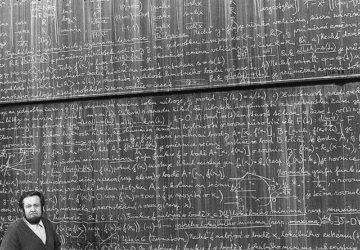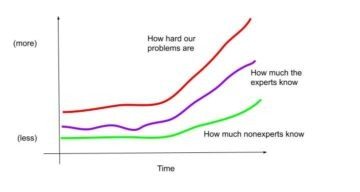by Charlie Huenemann

I routinely remind my students that human minds have always been as complicated as they are now, from when we dropped out of the trees to when we step upon the escalator. When we are reading in the history of ideas there is always the temptation to turn intellectual landscapes into cartoons where options are limited, painted in bright primary colors, and uncomplicated, like a toddler maze in Legoland. What’s going on, I suppose, is some hidden supposition that people who lived in earlier times must have been like us when we were children; or to put it more accurately, we suppose that people of earlier times must have been like we now conceive ourselves to have been when we were children. For we are wrong on both counts. Our lives when we were children were more complicated than we now remember, and every life that has ever been lived has been more complicated than we are now likely to suppose, because that’s just what it is to be human: we are complication engines.
But it is also true that we know more than we have in the past. (That of course doesn’t make the minds of the past any less complicated: minds are not complicated by what they know, but by what they think they know). This is clearly true at the species level: humans know more now than they ever have before – Moon shots, penicillin, Higgs boson, and all that. But I am guessing that it is also true that we as individuals, on average, have more knowledge in our heads than our historical counterparts, on average. I have to guess this because how on earth could anyone know for sure that this is so? What would they measure? Whom would they measure? When would they measure it?
For what it’s worth, IQ scores have been going up since their inception (see the Flynn effect; though note that IQ scores seem to be hitting a plateau in recent times). But it stands to reason that if more people are getting more education, and if what people are being taught to some degree tracks what we, as a species, have come to know about the world, then more individuals should be gaining more knowledge than previously. Of course, this general truth – if it is a truth – falls apart as soon as we start complicating the discussion by asking what we are measuring as “knowledge”. So long as we stay at the unfocused level of “you know, truths about the world”, we can maybe get away with the general claim that individuals know more now than they have in the past.
But our advance in knowledge has come with an advance in the complexity of our problems.
What I mean is that the problems we face as a species are, as a whole, intrinsically harder than problems we faced in the past at a species level. Populations in the past faced high infant mortality rates, famine, pestilence, and plague. We pretty much know how to solve all of those problems, even if we often fail to do so for economic or political reasons. The species-level problems we now face are global warming, artificial intelligence, nuclear and biological weapons, and political structures that are clearly inadequate for the global conditions we have created. These are really hard problems: hard for us to solve, maybe impossible, and at any rate more difficult intrinsically than any of the ones we have already solved. Again, clearly measuring just how difficult a problem is to solve is itself a difficult problem. But we can solve the problems that bedeviled earlier populations, and we can’t yet solve ours, and we know lots more, so that probably indicates something in the direction of the claim that our problems are harder.
Here is something I am further guessing is true: the growth in the difficulty of our problems has greatly outpaced our growth in knowledge. What I have in mind can be represented in the following graph (which you should not spend much time analyzing, as it does not employ any meaningful scales or units of measurement):

(Yes, this is what happens when a philosopher draws a graph.)
As you can plainly see, the gaps have gotten bigger: the gap between what nonexperts know and what experts know has gotten bigger, and the gap between these two levels of knowledge and the difficulty of the problems we face has gotten bigger. In the past, when we discovered a solution to a big problem, that solution was less out of reach of the nonexpert than any solutions to our problems are now. And the experts who solved those problems were also less out of reach of the nonexpert, and maybe even more fairly matched against the problems they were facing. Put another way, solving the problems of the past required, let’s say, a level 2 or level 3 expert. Solving the problems we now face will take a level 6 or 7 expert. And the knowledge of average individuals has certainly grown, but comparatively not as much.
I am trying hard not to commit the sin described at the start of this essay – namely, the sin of oversimplifying the past. The past was complicated, and solving its problems was very hard for the experts of the time. But now we know more and our problems are intrinsically even harder, and the growth in the hardness of the problems (this, again, is my guess) has outgrown the growth in our knowledge both as experts and as nonexperts. This means that, if there are any solutions to our problems, then they will require knowers who are not merely more knowledgeable than the rest of us, but several times more knowledgeable than they have been in the past.
In a slogan: our hard problems require more smarter people than the hard problems of the past. The tightrope we are walking keeps getting steeper and more slippery and higher off the ground – requiring even better tightrope walkers, tightrope walkers “more better” than the rest of us than has been required in the past. Put more simply, there’s some acceleration going on, both with our levels of expertise and our levels of problems.
I know my speculation is murky, but if there is anything to it, then we should expect to see something that in fact we are seeing: a growing gap between nonexperts and experts. If our problems are solvable, they will be solved by our experts, and those experts (according to my graph) will have to be further removed from what the nonexpert knows. As somebody’s uncle might say, “Time was you could sit down with one of them experts and get a clear picture of what they was talking about. Nowadays you can’t make sense of what they’re on about.” I think this homespun insight may well be right: it is much harder now than it ever has been to make sense of what the experts are saying if you are not one of them. Inventive analogies can always be cobbled together, but it’s getting harder and harder for popularizers to make analogies that bridge ordinary understanding with an accurate depiction of the truth. Just listen to someone trying to explain string theory, for crying out loud, or stock market derivatives.
And this, if true, would lead to a troubling consequence we are also seeing with greater frequency: distrust of the experts. No one likes not being an expert. And we hate being told that something is “too complicated” for us to understand. So it is a natural human response to start doubting that the experts really are experts, or to start insisting that we are just as much an expert as they are. For we know that expertise comes with its privileges. And if we cannot make proper judgments about expertise, we lose any understanding of how those privileges are awarded, or to whom, and the whole arrangement starts to look pretty stinky. We resent authorities whose authorities are based upon criteria we “are not qualified” evaluate. Conditions are then ripe for conspiracy theorists and self-made experts who reject genuine expert knowledge on the basis of some YouTube they saw.
We see more and more of this. And – if I am right – it is not just the result of people becoming less educated: they know more now than ever before. It is not just the result of some growing tide of irrationalism arising in response to an overly technological society, and it is not just the result of the politically and economically disenfranchised pinning their hopes on magical solutions, though both of these things may be true to some degree. The problem, rather, is built into our epistemic circumstance. We can’t get away from it. It is the direct consequence of the growing gap between what we know as individuals and what we know as a species, together with a bunch of truly frightening problems we have brought upon ourselves because we all know so much.
For obvious reasons, this is a problem – yet another really hard problem that rides in the wake of our other hard problems. A rising tide of people who reject expertise, coupled with political structures that are already ill-equipped to deal with the problems we now have, makes it even more difficult for anyone to implement any solutions that our experts might come up with. Call it “the problem of knowing too much for our own good” – coupled with the existential need to know increasingly more, in order to solve problems that are increasingly complex. We’re stuck in an epistemic arms race against ourselves.
It’s hard to see what might be done to combat this problem (as is true for nearly all our problems in economics and politics). We might have a spirited push toward more public education, as there seems to be some point in education at which a learner recognizes that experts know stuff that takes great time and effort to understand, and sometimes experts simply need to be trusted on that stuff. We might engineer our political system to give greater weight to policy proposals backed by expert knowledge. These seem like smart solutions, and not clearly impossible, though they do require sacrificing short-term gains for long-term survival – which is always a tough sell, particularly to those who reject expert knowledge. But this problem, like most problems, will not solve itself.
